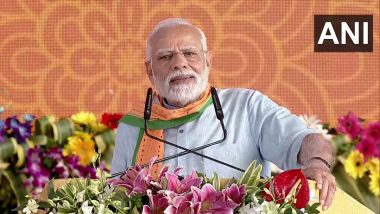Sheopur, September 17: Prime Minister Narendra Modi on Saturday said that the 'Project Cheetah', under which the BJP government at the Centre reintroduced big cats in the country with the support of Nambia, is the government's endeavour towards environment and wildlife conservation.
PM Modi, in an address to the nation following the release of cheetahs into Kuno National Park Saturday, said, "We lose certain things when we move away from our roots. Hence, we should take pride in our heritage."
The Prime Minister thanked the Namibia government for cooperation in relocating eight cheetahs to India and also congratulated the citizens of India for the successful release of the cheetahs in Kuno National Park. He said that the cheetahs will add to bio-diversity and boost tourism and generate income for locals. PM Narendra Modi Birthday: Odisha Artist Sudarshan Pattnaik Creates Sand Art of Prime Minister With 1,213 Mud Tea Cups at Puri Beach (Watch Video).
"The biodiversity that had become extinct and the link that got disconnected for decades, today we have a chance to reconnect it. Today the cheetah has returned to the soil of India. And I would also say that along with these cheetahs, the nature-loving consciousness of India has also been awakened with full force," said PM Modi. He further said that the Kuno National Park was chosen for the release of cheetahs after a detailed study by experts.
"It is unfortunate that we declared Cheetahs extinct from the country in 1952, but for decades no meaningful effort was made to rehabilitate them. Today, as we celebrate Azadi ka Amrit Mahotsav, the country has started rehabilitating Cheetahs with new energy," said the PM. The Prime Minister said that the grassland ecosystem would be restored again and biodiversity will increase further.
"It is true that, when nature and environment are protected, then our future is also secure. The avenues for growth and prosperity also open up. When cheetahs run again in Kuno National Park, the grassland ecosystem will be restored again, and biodiversity will increase further," said PM Modi.
PM Modi appealed to people for patience before visiting Kuno National Park to have a glimpse of cheetahs and referred to them as 'India's guests'. "These Cheetahs have come as guests, unaware of this area. For them to be able to make Kuno National Park their home, We will have to give these Cheetahs a few months' time. Following international guidelines, India is trying its best to settle these cheetahs. We must not let our efforts fail," said PM.
"India dropped from the list of natural cheetah habitats decades back, we have to made efforts to regain that place," he said. Emphasizing that India in the 21st century is giving a message to the world that economy and ecology are not conflicting fields and said, "For us, it is also the basis of our sensibility and spirituality." Cheetahs Back in India After Seven Decades: What Are Major Differences Between a Cheetah, Leopard and Jaguar?.
"This is a historic moment. Cheetahs will make us more environmentally conscious", he added. The cheetahs were declared extinct from India in 1952 but today 8 cheetahs (5 females and 3 males) were brought from Africa's Namibia as part of 'Project Cheetah' and the government's efforts to revitalise and diversify the country's wildlife and habitat.
The eight cheetahs were brought in a cargo aircraft in Gwalior as part of an inter-continental cheetah translocation project. Later, the Indian Air Force choppers carried the cheetahs to Kuno National Park from Gwalior Air Force Station. Radio collars have been installed in all the cheetahs to be monitored through satellite. Apart from this, there is a dedicated monitoring team behind each cheetah who will be monitoring their location for 24 hours.
Cheetahs have been brought under an MoU signed earlier this year. Under the ambitious Project Cheetah of the Indian government, the reintroduction of wild species particularly cheetah was undertaken as per the International Union for Conservation of Nature (IUCN) guidelines.
India has a long history of wildlife conservation. One of the most successful wildlife conservation ventures 'Project Tiger', which was initiated way back in 1972, has not only contributed to the conservation of tigers but also of the entire ecosystem. In continuation of this, the reintroduction of cheetahs is one step ahead and a milestone in the history of wildlife conservation in India.
(The above story is verified and authored by ANI staff, ANI is South Asia's leading multimedia news agency with over 100 bureaus in India, South Asia and across the globe. ANI brings the latest news on Politics and Current Affairs in India & around the World, Sports, Health, Fitness, Entertainment, & News. The views appearing in the above post do not reflect the opinions of LatestLY)













 Quickly
Quickly


